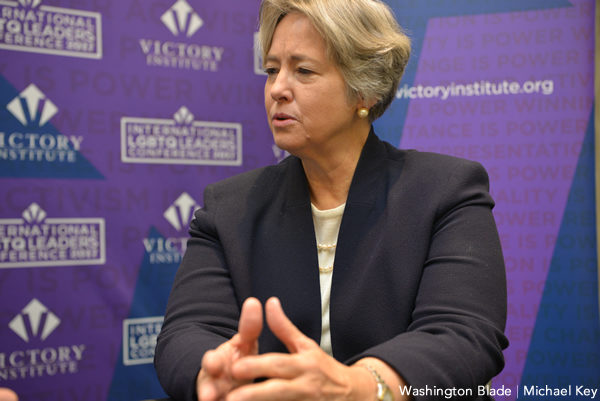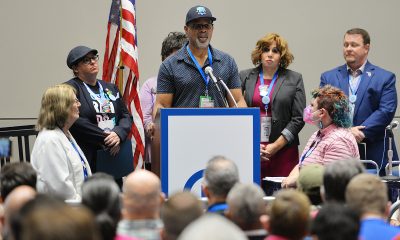National
Annise Parker on leading Victory Fund: ‘My focus is on the candidate’
“Trump is not the embodiment of the Republican Party for a lot of people.”
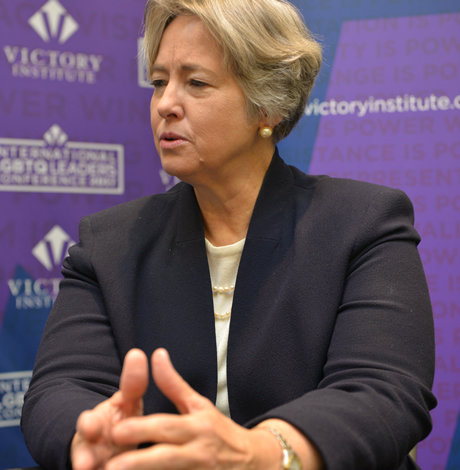
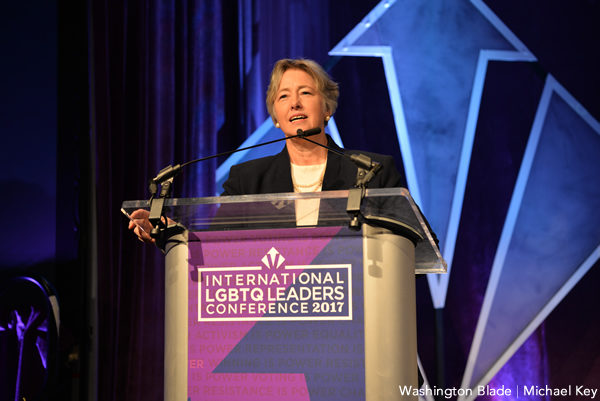
Annise Parker is now CEO of the Gay & Lesbian Victory Fund and Institute. (Washington Blade photo by Michael Key)
After more than 40 years of activism and three terms as mayor of Houston, Annise Parker has taken on a new leadership role as CEO of the Gay & Lesbian Victory Fund and Institute.
The change in leadership for the organizations was announced Friday at the annual International LGBTQ Leaders Conference. Parker, 61, told the crowd times have changed since she began her activism in the 1970s, but too many LGBT people “still have to fear” many of the dangers LGBT people faced decades ago.
“We celebrate milestones,” Parker said. “My race was one. But when you’re checking off milestones, it means you have not reached the end of the journey, and we don’t reach the end of this journey until all those fears are swept away and until all of our communities — across the United States, across cultures, across ethnicities — everyone of us has an equal opportunity to succeed.”
In an interview with the Washington Blade on Friday at the conference, Parker said the focus of her work would be on supporting LGBT candidates ready to make a difference.
“But it’s not just about having candidates, it’s about making sure that those candidates are funded and the Victory Fund does a great job of vetting candidates,” Parker said. “You have to have a good candidate, but passion’s not enough. You have to demonstrate their viability, and their ability to be successful.”
Parker takes the reins of the Victory Fund and Institute after the organizations were led for two-and-a-half years by Aisha Moodie-Mills, whose tenure was marked by historic wins by transgender candidates in local races in 2017. Moodie-Mills has left the organization with the stated purpose of championing work as a progressive activist.
Based on her long history in the LGBT movement, Parker said she brings a “different mindset” than Moodie-Mills and will be focused on the candidates, not progressive activism.
“I bring a different energy, I bring a different focus. My focus is on the candidate, but that doesn’t mean that anything we’ve done has been wrong or misplaced or inappropriate,” Parker said. “We just bring different styles and interests.”
Parker said the Victory Fund and Institute would take on the Trump administration “whenever we feel it’s necessary,” but keep electing LGBT candidates as the focus.
“Because it’s clear that simply standing up and speaking out against President Trump doesn’t have an impact, the best way to blunt his ability to hurt us is to put people in office who can vote against his anti-gay policies,” Parker said.
Parker will stay in Houston as CEO of the Victory Fund and Institute, but plans to travel often for the organizations, and will regularly be in D.C. Her tenure as CEO begins Monday.
Read the full interview here:
Washington Blade: We’ve seen a lot of success with LGBT candidates in 2017, particularly with the transgender wins in local races. How do you plan on building on that success going forward?
Annise Parker: Being successful in political campaigns starts with the candidate, so we are just as proud of the turnouts for our candidate training, the expressions of interest from candidates all over the country in running out and seeking Victory Fund support, so continuing to tap into the passion that people have right now and helping channel that into the campaigns.
But it’s not just about having candidates, it’s about making sure that those candidates are funded and the Victory Fund does a great job of vetting candidates. You have to have a good candidate, but passion’s not enough. You have to demonstrate their viability, and their ability to be successful. And so, that process is an important piece.
But then, once you have the right candidate in right race, it’s about making sure they have the resources and I know a lot of what I’ll be focused on, as the board does, is making sure that our candidates have the funding they need.
What I’ve seen over this — not quite a year — now, but through 2017 is the energy across the country. LGBT candidates, candidates of color, candidates who are women who are stepping up saying, “Enough is enough.” I want to make a difference and I’m going to jump into races, and they’re not discouraged at all by the idea that it’s an uphill battle, or that from an objective perspective, doesn’t look like they can win there.
They’re in it to win, but they’re not afraid of losing. They want to get out there and make statements. It’s a great time to come and tap into that kind of energy.
So we’re going to do that, but the fundamentals of Victory Fund haven’t changed in a very long time.
Blade: I wanted to ask you about that because I know you talked in your speech about how hard it was to be part of an organization in 1975 compared to 2017.
Parker: Different and it’s not different.
We have made tremendous progress, but if you look at when I was an activist in the 70s and 80s, I used to debate homophobes all the time, and they used to talk about the gay agenda. Remember the gay agenda? And I used to laugh and say there was no gay agenda.
Over time, I finally realized that there was a gay agenda, and the gay agenda is fairly straight forward. We want to be able to go to school without being bullied, we want to be to work at jobs we love and earn a paycheck so we can pay taxes to this country, we want to be able to serve openly in the military, we want to be able to walk down any street in America in safety, we want to be able to marry the people we love, we want to be able to adopt and raise children. That’s the GLBT agenda.
Many of those things we have achieved, but what we see now is how easily they can be swept away when we have the wrong person in the White House and the wrong attitude in Congress. So we made progress, but we can take this giant step back if we don’t keep our eyes focused on moving forward.
Blade: But what I wanted to get at there is do you think it’s simply enough for candidates to be out about their sexual orientation and gender identity, or is there something more that’s needed in 2017 in order to make an impact?
Parker: Yes and no.
It’s not enough to be a gay candidate. You have to be good at what you do. We have high expectations for our candidates, and that’s why we vet them, it’s why we look closely at their viability and the races they’re in. Not everybody who seeks a Victory Fund endorsement gets that Victory Fund endorsement.
But are we sending them out to be activists? No. We are sending them out to be who they are and represent their constituents and do the job they’ve been elected to do because when they do that, they make the really profound changes that we need to see that have been so transformative in America.
This latest anti-trans movement really, I think, unfortunately, wasn’t launched in Houston, but our HERO campaign [the 2015 campaign to preserve the Houston Equal Rights Ordinance] was where it really flowered. We had right-wing groups from all over the country, pouring money and resources in Houston. We had the right-wing ideologues coming through, the Mike Huckabees and Ted Cruzes coming though Houston and doing trans-bashing in Houston, and then they took it on the road to North Carolina and back to Texas with the statewide bathroom bill.
The difference in my more than 40 years of activism: No one in America can say they know no person who is gay or lesbian. Whether it’s simply they say, “Well, I know Ellen on TV,” whatever it is, they know someone, and very, very few people in America today can say they don’t know anyone, either in their family or their community who is gay.
But for too many Americans, transgender issues are unknown. They don’t know someone who is transgender; they don’t understand what the issues are, and they make them the other. And a lot of what we’re seeing is the arguments are the same arguments they used against us — us meaning the gay and lesbian part of the LGBT community — against the transgender community. Today, it’s the same arguments just slightly repackaged, but it’s all about taking something that is unknown and that you can create a fear around it and use it for either for political purposes or economic purposes.
And so, what is going to be so powerful, just as it took us a long time to get there for the gay and lesbian community, but this is a different era, and I think we’re going to make much faster progress, but what it’s going to take is our transgender brothers and sisters to get out there and speak for themselves, to go out as candidates and raise awareness.
And again, they don’t have to carry the flag for the community. They have to be out and they have to do a good job, and that’s what changes hearts and minds.
Blade: Let’s talk about the Victory Institute. Where do you envision that going as an organization, particularly the robust international program?
Parker: I started by saying the focus is on the candidates. We can’t win races if you don’t have the candidates, and that is the Victory Institute.
But we all understand we can turn this negative tide that’s coming out of Washington, we can firmly secure our rights here in America and we have to realize that agenda that I outlined, that still has to be won in all of these other countries around the world, and that we have a responsibility from our positions of relative privilege to make sure to support people who are doing the seminal work in those countries. It’s not about America; it’s about the LGBT community.
And some of the most horrific problems are going on in other places. When I was mayor of Houston, Houston has a huge international focus and I did a lot of trade missions. And everywhere I went, I made a practice of meeting with local LGBT leaders and women’s organizations, so I have met with lesbians in South Africa and transgender women in Indonesia, India and Brazil.
The tip of the spear right now is transgender issues. Their courage particularly in countries where it’s not — they’re not worried about walking down the street and having someone say something rude to them, they’re worried about walking down the street and having someone kill them. And we have to make sure that we stand together with them.
Blade: The anti-LGBT policies of the Trump administration are ongoing. To what extent will the Victory Fund and the Institute tackle that?
Parker: As an organization, our focus is on supporting candidates, but we are advocates for LGBT rights and issues, so with the other organizations in this space, we’ll stand up whenever we feel it’s necessary, but we also believe that the best way to blunt that — because it’s clear that simply standing up and speaking out against President Trump doesn’t have any impact, the best way to blunt his ability to hurt us is to put people in office who can vote against his anti-gay policies.
What I’ve seen over the last year, I actually did some extensive polling in Houston for other purposes, people in an odd way, they see Trump as a one-off. Trump is not the embodiment of the Republican Party for a lot of people. I know we like to think that that’s the case, those of us who are Democrats probably think that’s the case and we’re going to use that to demonize him, which doesn’t take much work, and use that to run. It’s not enough.
He’s Donald Trump, and there’s a core following that he has, but for most Americans, whether they love him or hate him, he’s over there, he’s a one-off, and it doesn’t translate into other down-ballot races.
Blade: That’s kind of what I wanted to get at with your vision for the Victory Fund and Institute. Would you say that they’re progressive organizations, or do they seek to advance LGBT people, LGBT rights regardless of political affiliation or ideology?
Parker: So that’s a really interesting question.
It’s clear that Aisha Moodie-Mills is very much a part of the progressive movement. I like to consider myself there as well, but as an organization our focus is completely bipartisan and it is about finding capable, qualified LGBT candidates, helping them get elected.
Now, capable and qualified, someone who’s LGBT but is ashamed of it, someone who’s LGBT and actively supports anti-gay legislative initiatives, we would not support that kind of candidate. So does that make us a progressive organization?
We also build alliances. Many of our candidates are pro-choice, they have progressive political agendas and they build coalitions in order to get elected. It’s not as if there’s any place in America — well, maybe West Hollywood, who knows — where we are a majority, so it requires us to build coalitions.
And our LGBT candidates are masters of putting together strong coalitions across racial and ethnic lines, with labor, with environmental organizations and voters in order to put a winning package together, so by that definition, we are absolutely a progressive organization, but that’s not our focus.
Blade: Would you say you’d have a different approach than Aisha going forward, or is it building off what she did?
Parker: I think we have to reflect what’s happening in the world around us as an organization. I’m a generation of activists older than she. I have children older than she is — adopted children, children nonetheless — and I bring a different mindset.
I was an activist in the 70s and I have seen the changes and sort of the arc of our history. I bring a different energy, I bring a different focus. My focus is on the candidate, but that doesn’t mean that anything we’ve done has been wrong or misplaced or inappropriate. We just bring different styles and interests, and as I said, we have to have coalitions to get elected. Maybe someday the right will offer us opportunities for coalition building, but today all of our coalitions are going to be on the left and in progressive communities because the right has become so virulently anti-gay.
There are gay elected officials here who are Republicans and so stand up proudly within their party and never waver on our issues, and we need more of that.
Blade: In the past, the Victory Institute has sought to appoint LGBT people to the U.S. government. Will the Victory Institute continue that within the Trump administration? I’m aware of four Trump appointees who are LGBT. Would the Victory Institute support them?
Parker: Our goal is to put people into office where they can make a difference. It’s not very fertile ground to plow, but that doesn’t mean we’re not going to try to plow it.
Blade: And will you continue to support Republican candidates who are LGBT?
Parker: Yes. But they have to, obviously, support, as I have outlined, the LGBT agenda.
It’s not about political party, it’s about making sure we have candidates who can advocate, or just being present. There are times when I was in office in the 18 years that I was in office that I had to stand up and articulate LGBT issues, but I think I was just as effective those times when I was simply there with my wife and making sure that they had to deal with me on human basis.
And if you talk to the office holders in the room, you’ll find out that they all have those kinds of stories where they’ve managed to change the trajectory of a bill or made inroads in some way simply because they were there and fully present in all aspects of their life.
Blade: Let’s talk about the approach to the candidates Victory Fund endorses. I think one big issue, and you talked about this in your speech, is religious freedom and the tension that has with LGBT rights, rightly or wrongly.
Parker: No one has a right to discriminate against me. I mean, that’s what RFRA bills are. The right to discriminate. If you are given the right to discriminate against me because I’m gay or because I’m transgender, why is that any different from you having to discriminate against someone who happens to be black or who happens to be a religion you don’t agree with. We have to fight against these bills.
Blade: But what would be your advice to candidates who are confronted with this? I remember when you were mayor of Houston, this became an issue with the subpoena of the sermons and there was this big argument that was infringing upon these pastors’ religious liberty.
Parker: There was a big argument. It happened without me knowing about it. I didn’t think it was wrong, but I rescinded it simply because it created too much of a peripheral issue. But that had to do with litigation around HERO. It wasn’t anything to do with RFRA or the ability to discriminate. That actually was around the litigation.
Blade: But what would be your advice to candidates who are confronted by those who say your views are an assault on religious liberty?
Parker: We are all Americans, and one of the bedrock values of America is that we treat each other fairly and decently and that everyone should be afforded the full rights of being an American.
We have fought wars against people who targeted minority populations. In World War II, millions of Americans died to fight an enemy that was specifically targeting Jews, Gypsies and LGBT people. It is fundamentally un-American. It took us a long time to get it right. We had to go through segregation, but it is fundamentally un-American to say I don’t like you, I’m not going to serve you. Once you allow someone to do that, it’s impossible to draw the line again.
Blade: One other thing I wanted to ask you about, we mentioned the Trump administration, I’m very curious as to what your take is on the massive hurricanes we had in recent months and Houston was devastated by Hurricane Harvey. How would you evaluate the administration’s handling of the response?
Parker: And I had a great deal of fun with Ann Coulter and my hurricane weather control abilities.
His response to the hurricane?
Blade: How would you evaluate that?
Parker: Inadequate across the board, but mediocre in Texas and in Florida and absolutely embarrassing in Puerto Rico and the U.S. Virgin Islands.
Blade: Why do you think there’s that discrepancy?
Parker: I think it’s all about his voting base. In Texas we’re also fighting against an incompetent state government that is not fully funding the recovery.
And this is my opinion. I’m not going to speak for the Victory Fund here because this is far afield of that. But having been an elected official at the local level, the Bush 43 administration learned after Katrina, and the Obama administration absolutely, Texas, Republican leadership, Rick Perry — I had a great working relationship with Rick Perry — they understood what was needed to recover from those kinds of storms, and you saw that in Sandy.
Now I think we have an administration that fundamentally doesn’t understand the role of the federal government in disaster recovery, doesn’t want to spend money on people who aren’t part of the president’s voting base and have had a tremendous amount of turnover in those positions, so actually have lost the expertise to know what to do, so it’s a three-fer, and it’s causing tremendous problems.
Texas voted for Trump.
Blade: Houston did not, though.
Parker: Houston did not. The big cities across Texas are all Democratic islands in a big, red sea, but Texas voted for Trump. 20 percent of the refining capacity is in Houston or just on the border of the city of Houston. You would think from a strategic standpoint that he’d be focusing on making sure that there’s a complete recovery across the energy industry base down there, but it’s not happening.
And Puerto Rico? They don’t vote. It’s an afterthought.
Blade: I want to go back to Texas and talk about Pigeon v. Turner. [A case in which the Texas Supreme Court questioned whether the Obergefell ruling guarantees same-sex spousal to city employees. The U.S. Supreme Court refused to review the decision of the Texas Supreme Court, which remanded its findings to lower state court.]
Parker: Actually, it was Piegon v. Parker. It’s referred to both ways, but yeah.
Blade: You mentioned that in your speech. How concerned are you about that litigation?
Parker: When you track what happened, the state Supreme Court refused to intervene, and then the lieutenant governor of the state of Texas, the governor and the right-wing leaders across the state put pressure on the elected state Supreme Court, and they re-evaluated and then sent it back down to the appellate court.
It’s transparent to everybody in the state that they bowed to political pressure. That said, the argument being made by the right is that the Supreme Court says you can have marriage, but you can’t have benefits. There’s no right to benefits. Well, that’s absurd. Ultimately, if we get all the way up to the U.S. Supreme Court, they’ll straighten it out.
But from a practical standpoint, even if we lose Pigeon v. Parker, Pigeon v. Turner, even if the city of Houston loses, there’s no impact because the mayor of Houston is going to continue to offer benefits. They possibly have a pyrrhic victory which says no you don’t have to offer benefits, and well say, no, we don’t have to offer them but we’re going to. Mayor Turner’s clear on that and we’ll go forward.
But I have no faith in the Texas Supreme Court. In fact, we have several really great candidates running statewide. One of our LGBT candidates is a local elected judge who’s running for the state Supreme Court for precisely this reason, that they are making these kinds of political decisions. But there’ll be no practical impact from it.
Blade: My last question is as someone how has been part of the movement for so many years, how would you evaluate the LGBT movement now? Is it stronger than it was, or is it more anemic?
Parker: Yes and no.
It’s stronger in the sense there’s so many more people, it’s broader and deeper and it’s really reflective of the vast diversity of our community across America, but it’s weaker in only one sense. And that is that we have made gains and there a lot of folks who felt we can lay our burden down, no, we got this, it’s going to go in the right direction, I can go do other things, I don’t have to show up and vote every time, I don’t have to send money to all these organizations, I don’t have to protest or write letters or do this. Yes you do.
So on the whole it is much stronger, but it’s different and the issues evolve, and how we have to address those issues evolved. And I’ll just close with we had a vote on Houston’s non-discrimination ordinance.
And to be clear, because the media gets this wrong all the time, we had no non-discrimination ordinance. We didn’t decide to add gender identity and sexual orientation. We had zero ordinance. So we wrote a comprehensive ordinance that included everybody, and when the citizens of Houston voted it down, we don’t have an ordinance that protects black people in Houston.
Everything about the anti-HERO vote was about men in women’s bathrooms, but what was interesting is the average age of voters was 68 years old. If the average age of voter in the city of Houston election had been 50, we would have won. If the average age of voter had been 35, they would have laughed it off the ballot.
I think we’re going to win the war. In fact, we’ve already won the war, but we lose a lot of battles between now and then, and we can’t take our foot off the pedal. All of the things we’ve been doing for the last 45 years since Stonewall basically throwing ourselves into the political process, showing up, voting, protesting when necessary, we still have to keep doing it.
It’s extremely frustrating, the HERO vote because of the low turnout. And young people, you absolutely got it, but they have to vote.
Note: This interview has been edited for length.
U.S. Supreme Court
Competing rallies draw hundreds to Supreme Court
Activists, politicians gather during oral arguments over trans youth participation in sports

Hundreds of supporters and opponents of trans rights gathered outside of the United States Supreme Court during oral arguments for Little v. Hecox and West Virginia v. B.P.J. on Tuesday. Two competing rallies were held next to each other, with politicians and opposing movement leaders at each.
“Trans rights are human rights!” proclaimed U.S. Sen. Ed Markey (D-Mass.) to the crowd of LGBTQ rights supporters. “I am here today because trans kids deserve more than to be debated on cable news. They deserve joy. They deserve support. They deserve to grow up knowing that their country has their back.”

“And I am here today because we have been down this hateful road before,” Markey continued. “We have seen time and time again what happens when the courts are asked to uphold discrimination. History eventually corrects those mistakes, but only after the real harm is done to human beings.”
View on Threads
U.S. Education Secretary Linda McMahon spoke at the other podium set up a few feet away surrounded by signs, “Two Sexes. One Truth.” and “Reality Matters. Biology Matters.”
“In just four years, the Biden administration reversed decades of progress,” said McMahon. “twisting the law to urge that sex is not defined by objective biological reality, but by subjective notion of gender identity. We’ve seen the consequences of the Biden administration’s advocacy of transgender agendas.”

U.S. Rep. Mark Takano (D-Calif.), chair of the Congressional Equality Caucus, was introduced on the opposing podium during McMahon’s remarks.
“This court, whose building that we stand before this morning, did something quite remarkable 6 years ago.” Takano said. “It did the humanely decent thing, and legally correct thing. In the Bostock decision, the Supreme Court said that trans employees exist. It said that trans employees matter. It said that Title VII of the Civil Rights Act protects employees from discrimination based on sex, and that discrimination based on sex includes discrimination based on gender identity and sexual orientation. It recognizes that trans people have workplace rights and that their livelihoods cannot be denied to them, because of who they are as trans people.”
“Today, we ask this court to be consistent,” Takano continued. “If trans employees exist, surely trans teenagers exist. If trans teenagers exist, surely trans children exist. If trans employees have a right not to be discriminated against in the workplace, trans kids have a right to a free and equal education in school.”
Takano then turned and pointed his finger toward McMahon.
“Did you hear that, Secretary McMahon?” Takano addressed McMahon. “Trans kids have a right to a free and equal education! Restore the Office of Civil Rights! Did you hear me Secretary McMahon? You will not speak louder or speak over me or over these people.”
Both politicians continued their remarks from opposing podiums.
“I end with a message to trans youth who need to know that there are adults who reject the political weaponization of hate and bigotry,” Takano said. “To you, I say: you matter. You are not alone. Discrimination has no place in our schools. It has no place in our laws, and it has no place in America.”
U.S. Supreme Court
Supreme Court hears arguments in two critical cases on trans sports bans
Justices considered whether laws unconstitutional under Title IX

The Supreme Court heard two cases today that could change how the Equal Protection Clause and Title IX are enforced.
The cases, Little v. Hecox and West Virginia v. B.P.J., ask the court to determine whether state laws blocking transgender girls from participating on girls’ teams at publicly funded schools violates the 14th Amendment’s Equal Protection Clause and Title IX. Once decided, the rulings could reshape how laws addressing sex discrimination are interpreted nationwide.
Chief Justice John Roberts raised questions about whether Bostock v. Clayton County — the landmark case holding that Title VII of the Civil Rights Act of 1964 protects employees from discrimination based on sexual orientation or gender identity — applies in the context of athletics. He questioned whether transgender girls should be considered girls under the law, noting that they were assigned male at birth.
“I think the basic focus of the discussion up until now, which is, as I see it anyway, whether or not we should view your position as a challenge to the distinction between boys and girls on the basis of sex or whether or not you are perfectly comfortable with the distinction between boys and girls, you just want an exception to the biological definition of girls.”
“How we approach the situation of looking at it not as boys versus girls but whether or not there should be an exception with respect to the definition of girls,” Roberts added, suggesting the implications could extend beyond athletics. “That would — if we adopted that, that would have to apply across the board and not simply to the area of athletics.”
Justice Clarence Thomas echoed Roberts’ concerns, questioning how sex-based classifications function under Title IX and what would happen if Idaho’s ban were struck down.
“Does a — the justification for a classification as you have in Title IX, male/female sports, let’s take, for example, an individual male who is not a good athlete, say, a lousy tennis player, and does not make the women’s — and wants to try out for the women’s tennis team, and he said there is no way I’m better than the women’s tennis players. How is that different from what you’re being required to do here?”
Justice Samuel Alito addressed what many in the courtroom seemed reluctant to state directly: the legal definition of sex.
“Under Title IX, what does the term ‘sex’ mean?” Alito asked Principal Deputy Solicitor General Hashim Mooppan, who was arguing in support of Idaho’s law. Mooppan maintained that sex should be defined at birth.
“We think it’s properly interpreted pursuant to its ordinary traditional definition of biological sex and think probably given the time it was enacted, reproductive biology is probably the best way of understanding that,” Mooppan said.
Justice Sonia Sotomayor pushed back, questioning how that definition did not amount to sex discrimination against Lindsay Hecox under Idaho law. If Hecox’s sex is legally defined as male, Sotomayor argued, the exclusion still creates discrimination.
“It’s still an exception,” Sotomayor said. “It’s a subclass of people who are covered by the law and others are not.”
Justice Elena Kagan highlighted the broader implications of the cases, asking whether a ruling for the states would impose a single definition of sex on the 23 states that currently have different laws and standards. The parties acknowledged that scientific research does not yet offer a clear consensus on sex.
“I think the one thing we definitely want to have is complete findings. So that’s why we really were urging to have a full record developed before there were a final judgment of scientific uncertainty,” said Kathleen Harnett, Hecox’s legal representative. “Maybe on a later record, that would come out differently — but I don’t think that — ”

“Just play it out a little bit, if there were scientific uncertainty,” Kagan responded.
Justice Brett Kavanaugh focused on the impact such policies could have on cisgender girls, arguing that allowing transgender girls to compete could undermine Title IX’s original purpose.
“For the individual girl who does not make the team or doesn’t get on the stand for the medal or doesn’t make all league, there’s a — there’s a harm there,” Kavanaugh said. “I think we can’t sweep that aside.”
Justice Amy Coney Barrett questioned whether Idaho’s law discriminated based on transgender status or sex.
“Since trans boys can play on boys’ teams, how would we say this discriminates on the basis of transgender status when its effect really only runs towards trans girls and not trans boys?”
Harnett responded, “I think that might be relevant to a, for example, animus point, right, that we’re not a complete exclusion of transgender people. There was an exclusion of transgender women.”
Justice Ketanji Brown Jackson challenged the notion that explicitly excluding transgender people was not discrimination.
“I guess I’m struggling to understand how you can say that this law doesn’t discriminate on the basis of transgender status. The law expressly aims to ensure that transgender women can’t play on women’s sports teams… it treats transgender women different than — than cis-women, doesn’t it?”
Idaho Solicitor General Alan Hurst urged the court to uphold his state’s ban, arguing that allowing participation based on gender identity — regardless of medical intervention — would deny opportunities to girls protected under federal law.
Hurst emphasized that biological “sex is what matters in sports,” not gender identity, citing scientific evidence that people assigned male at birth are predisposed to athletic advantages.
Joshua Block, representing B.P.J., was asked whether a ruling in their favor would redefine sex under federal law.
“I don’t think the purpose of Title IX is to have an accurate definition of sex,” Block said. “I think the purpose is to make sure sex isn’t being used to deny opportunities.”
Becky Pepper-Jackson, identified as plaintiff B.P.J., the 15-year-old also spoke out.
“I play for my school for the same reason other kids on my track team do — to make friends, have fun, and challenge myself through practice and teamwork,” said Pepper-Jackson. “And all I’ve ever wanted was the same opportunities as my peers. But in 2021, politicians in my state passed a law banning me — the only transgender student athlete in the entire state — from playing as who I really am. This is unfair to me and every transgender kid who just wants the freedom to be themselves.”

Outside the court, advocates echoed those concerns as the justices deliberated.
“Becky simply wants to be with her teammates on the track and field team, to experience the camaraderie and many documented benefits of participating in team sports,” said Sasha Buchert, counsel and Nonbinary & Transgender Rights Project director at Lambda Legal. “It has been amply proven that participating in team sports equips youth with a myriad of skills — in leadership, teamwork, confidence, and health. On the other hand, denying a student the ability to participate is not only discriminatory but harmful to a student’s self-esteem, sending a message that they are not good enough and deserve to be excluded. That is the argument we made today and that we hope resonated with the justices of the Supreme Court.”
“This case is about the ability of transgender youth like Becky to participate in our schools and communities,” said Joshua Block, senior counsel for the ACLU’s LGBTQ & HIV Project. “School athletics are fundamentally educational programs, but West Virginia’s law completely excluded Becky from her school’s entire athletic program even when there is no connection to alleged concerns about fairness or safety. As the lower court recognized, forcing Becky to either give up sports or play on the boys’ team — in contradiction of who she is at school, at home, and across her life — is really no choice at all. We are glad to stand with her and her family to defend her rights, and the rights of every young person, to be included as a member of their school community, at the Supreme Court.”
The Supreme Court is expected to issue rulings in both cases by the end of June.
Minnesota
Reports say woman killed by ICE was part of LGBTQ community
Renee Nicole Good shot in Minneapolis on Wednesday

A U.S. Immigration and Customs Enforcement agent shot and killed a woman in Minneapolis as she attempted to drive away from law enforcement during a protest on Wednesday.
The Star Tribune newspaper identified the victim as Renee Nicole Good, 37, a Minneapolis resident who lived blocks from where she was shot in the Central neighborhood, according to reports. Donna Ganger, Good’s mother, told the Star Tribune that her daughter lived in the Twin Cities with her wife.
Multiple videos of the shooting have gone viral on social media, showing various angles of the fatal incident — including footage that shows Good getting into her car and attempting to drive away from law enforcement officers, who had their weapons drawn.
In the videos, ICE agents can be heard telling Good to “get out of the fucking car” as they attempted to arrest her. Good, who press reports say was married to a woman, ended up crashing her car into an electric pole and other vehicles. She was later transported from the scene of the shooting and died at the hospital.
President Donald Trump defended the ICE agent on Truth Social, saying the officer was “viciously” run over — a claim that coincides with Homeland Security Secretary Kristi Noem’s assessment of the situation. Noem, a South Dakota Republican, insisted the officer “fired defensive shots” at Good after she attempted to run over law enforcement agents “in an attempt to kill them — an act of domestic terrorism.”
Multiple state and local officials disputed claims that the shooting was carried out in self-defense at the same time Noem was making those assertions.
An Instagram account that appears to belong to Good describes her as a “poet and writer and wife and mom and shitty guitar strummer from Colorado; experiencing Minneapolis, MN,” accompanied by a rainbow flag emoji.
A video posted to X after the shooting shows a woman, reportedly her wife, sitting on the ground, crying and saying, “They killed my wife. I don’t know what to do.”
“We’ve dreaded this moment since the early stages of this ICE presence in Minneapolis,” Mayor Jacob Frey said during a Wednesday press conference. “Having seen the video myself, I want to tell everybody directly that [the DHS’s claim of self-defense] is bullshit. This was an agent recklessly using power that resulted in somebody dying, getting killed.”
“I have a message for ICE. To ICE, get the fuck out of Minneapolis,” Frey continued. “We do not want you here. Your stated reason for being in this city is to create some kind of safety, and you are doing exactly the opposite. People are being hurt. Families are being ripped apart. Long-term Minneapolis residents that have contributed so greatly to our city, to our culture, to our economy are being terrorized, and now somebody is dead. That’s on you, and it’s also on you to leave.”
Across the Capitol, members of the House and the Senate condemned the actions of the officer.
“There’s no indication she’s a protester, there’s nothing that at least you can see on the video, and therefore nothing that the officers on the ground could see that identify her as someone who’s set out to try to do harm to an ICE officer,” U.S. Sen. Elizabeth Warren (D-Mass.) said Wednesday night on MS NOW’s “The Weeknight.”
“There is no evidence that has been presented to justify this killing,” House Minority Leader Hakeem Jeffries (D-N.Y.) said in a statement on his website. “The masked ICE agent who pulled the trigger should be criminally investigated to the full extent of the law for acting with depraved indifference to human life.”
“ICE just killed someone in Minneapolis,” U.S. Rep. Robert Garcia (D-Calif.) the highest-ranking Democrat on the House Oversight Committee, posted on X. “This administration’s violence against communities across our country is horrific and dangerous. Oversight Democrats are demanding answers on what happened today. We need an investigation immediately.”
In a statement to the Advocate, Human Rights Campaign President Kelley Robinson wrote, “Today, a woman was senselessly killed in Minneapolis during an ICE action — a brutal reminder that this agency and the Trump regime put every community at risk, spreading fear instead of safety. Reports that she may have been part of the LGBTQ+ community underscore how often the most vulnerable pay the highest price.”
National LGBTQ Task Force President Kierra Johnson also responded to Good’s death.
“We recognize and mourn the loss of Renee Nicole Good and extend our condolences to her family, loved ones, and community,” said Johnson in a statement. “This loss of life was preventable and reprehensible, particularly coming at the hands of federal agents.”
National
Top 10 LGBTQ national news stories of 2025
Trump, Supreme Court mount cruel attacks against trans community

President Trump’s anti-LGBTQ agenda dominated national news in 2025, particularly his cruel attacks on trans Americans. Here are our picks for the top 10 LGBTQ news stories the Blade covered in 2025.
10. Trump grants clemency to George Santos

President Donald Trump granted clemency to disgraced former Long Island Rep. George Santos. Santos was sentenced to 87 months in federal prison after pleading guilty to wire fraud and aggravated identity theft and had served just 84 days of his more than seven-year sentence. He lied to both the DOJ and the House Ethics Committee, including about his work and education history, and committed campaign finance fraud.
9. U.S. Olympics bans trans women athletes
The United States Supreme Court decided in 2025 to take up two cases — Little v. Hecox and West Virginia v. B.P.J.— both of which concern the rights of transgender athletes to participate on sports teams. The cases challenge state laws under the Equal Protection Clause of the 14th Amendment, which prevents states from offering separate boys’ and girls’ sports teams based on biological sex determined at birth. Both cases are set to be heard in January 2026. The developments follow a decision by the United States Olympic & Paralympic Committee to change eligibility rules to prohibit transgender women from competing in women’s sporting events on behalf of the United States, following Trump’s Executive Order 14201, “Keeping Men Out of Women’s Sports.”
8. FDA approves new twice-yearly HIV prevention drug
The U.S. Food and Drug Administration on June 18 approved a newly developed HIV/AIDS prevention drug that needs to be taken only twice a year, with one injection every six months. The new drug, lenacapavir, is being sold under the brand name Yeztugo by pharmaceutical company Gilead Sciences. According to trial data, 99.9 percent of participants who received Yeztugo remained HIV negative. This emerging technology comes amid direct cuts to HIV/AIDS research measures by the Trump–Vance administration, particularly targeting international HIV efforts such as PEPFAR.
7. LGBTQ people ‘erased’ from gov’t reports
Politico reported in March that the Trump–Vance administration is slashing the State Department’s annual human rights report, cutting sections related to the rights of women, people with disabilities, the LGBTQ+ community, and more. Members of Congress objected to the removal of the subsection on “Acts of Violence, Criminalization, and Other Abuses Based on Sexual Orientation, Gender Identity or Expression, or Sex Characteristics (SOGIESC)” from the State Department’s Annual Country Reports on Human Rights Practices.
In a Sept. 9 letter to Secretary of State Marco Rubio, U.S. Reps. Robert Garcia (D-Calif.), Julie Johnson (D-Texas), and Sarah McBride (D-Del.) urged the department to restore the information or ensure it is integrated throughout each report, noting that the reports serve as key evidence for asylum seekers, attorneys, judges, and advocates assessing human rights conditions and protection claims worldwide.
6. Trump admin redefines ‘sex’ in all HHS programs

The Trump administration canceled more than $800 million in research into the health of sexual and gender minority groups. More than half of the National Institutes of Health grants scrapped through early May involved studies of cancers and viruses that disproportionately affect LGBTQ people.
The administration is also pushing to end gender-affirming care for transgender youth, according to a new proposal from the Department of Health and Human Services, NPR reported. The administration is considering blocking all Medicaid and Medicare funding for services at hospitals that provide pediatric gender-affirming care. “These rules would be a significant escalation in the Trump administration’s attack on access to transgender health care,” said Katie Keith, director of the Center for Health Policy and Law at Georgetown University.
5. FBI plans to label trans people as ‘violent extremists’
The Human Rights Campaign, Transgender Law Center, Equality Federation, GLAAD, PFLAG, and the Southern Poverty Law Center condemned reports that the FBI, in coordination with the Heritage Foundation, may be working to designate transgender people as “violent extremists.” The concerns followed a report earlier this month by independent journalist Ken Klippenstein, who cited two anonymous national security officials saying the FBI is considering treating transgender subjects as a subset of a new threat category.
That classification—originally created under the Biden administration as “Anti-Authority and Anti-Government Violent Extremists” (AGAAVE) — was first applied to Jan. 6 rioters and other right-wing extremists. Advocates said the proposal appears to stem from the false claim that the assassination of Charlie Kirk was committed by a transgender person.
4. Pentagon targets LGBTQ service members

Acting in agreement with the growing anti-LGBTQ sentiment from the Trump administration, during a televised speech to U.S. military leaders at Marine Corps Base Quantico in late September, Defense Secretary Pete Hegseth denounced past military leadership for being too “woke,” citing DEI initiatives and LGBTQ inclusion within the Department of Defense. During the 45-minute address, Hegseth criticized inclusive policies and announced forthcoming directives, saying they would ensure combat requirements “return to the highest male standard only.”
Since 2016, a Navy replenishment oiler had borne the name of gay rights icon Harvey Milk, who served in the Navy during the Korean War and was separated from service under other than honorable conditions due to his sexuality before later becoming one of the first openly LGBTQ candidates elected to public office. In June 2025, the ship was renamed USNS Oscar V. Peterson.
The U.S. Air Force also announced that transgender service members who have served between 15 and 18 years would be denied early retirement and instead separated from the military without benefits. Transgender troops will be given the option of accepting a lump-sum payout offered to junior service members or being removed from service.
In February, the Pentagon said it would draft and submit procedures to identify transgender service members and begin discharging them from the military within 30 days.
3. Trump blames Democrats, trans people for gov’t shutdown
Republicans failed to reach an agreement with Democrats and blamed them for the government shutdown, while Democrats pointed to Republicans for cutting health care tax credits, a move they said would result in millions of people paying significantly higher monthly insurance premiums next year. In the White House press briefing room, a video of Democrats discussing past government shutdowns played on a loop as the president continued to blame the Democratic Party and “woke” issues, including transgender people.
“A lot of good can come from shutdowns. We can get rid of a lot of things. They’d be Democrat things,” Trump said the night before the shutdown. “They want open borders. Men playing in women’s sports. They want transgender for everybody.”
2. Supreme Court joins attacks on LGBTQ Americans

The U.S. Supreme Court issued multiple rulings this year affecting LGBTQ people. In Mahmoud v. Taylor (6–3), it ruled that public schools must give parents advance notice and the option to opt children out of lessons on gender or sexuality that conflict with their religious beliefs. The case arose after Montgomery County, Md., schools added LGBTQ-inclusive storybooks to the elementary curriculum.
In June, the court upheld Tennessee’s ban on gender-affirming care for transgender minors, protecting similar laws in more than 20 states. Lawmakers and advocates criticized the ruling, and a coalition of seven medical associations warned it strips families of the right to direct their own health care.
The Court also allowed the Trump administration to enforce a ban on transgender military personnel and to implement a policy blocking passports with “X” gender markers, with the federal government recognizing only male and female designations.
1. Trump inaugurated for second time
President Donald Trump became the 47th president after winning Wisconsin, securing 277 of the 270 electoral votes needed. His guidebook, Project 2025, outlined the Republican Party’s goals under his new leadership, with a particular focus on opposing transgender rights.
Trump nominated openly gay hedge fund executive Scott Bessent as U.S. Treasury Secretary, a role he eventually assumed. Bessent became the highest-ranking openly gay U.S. government official in American history.

Honorable mention: The war on rainbow crosswalks escalates around the country
Florida Gov. Ron DeSantis (R) ordered state transportation officials to remove a rainbow-colored crosswalk in Orlando next to the Pulse gay nightclub, where 49 mostly LGBTQ people were killed in a 2016 mass shooting. The move follows a July 1, 2025, announcement by U.S. Transportation Secretary Sean Duffy that, with support from President Trump, the department adopted a “nationwide roadway safety initiative” that political observers say could be used to require cities and states to remove rainbow street crosswalks.
Crime & Justice
San Fernando Valley LGBTQ+ community center Somos Familia Valle is trying to rebuild from a “traumatizing” break-in
This Monday, burglars stole $8,000 worth of essential materials from the organization.

In the early hours of Monday morning, burglars broke through three walls of the Sun Valley LGBTQ+ community center Somos Familia Valle. They rummaged through two main rooms and left with $8,000 worth of technology: 15 Chromebooks, two iPads, a camera, two microphones, and a large audio system that staff members used to host programs like Queer Yoga and Vogue Classes. “I was scared because I was wondering if it was a hate thing,” said Somos Familia Valle co-founder and president Kevin Al Perez.
Perez had woken that day with his usual routine of checking the building’s cameras and Wi-Fi systems remotely. Suddenly, he jolted after noticing they’d been turned off for hours. Since he was away, he asked his father to check on the space. “Everything’s fine,” his father replied, who said that the main door looked untouched.
After stepping inside, the damage became clear. Pieces of walls were torn out and strewn across the floor, items were hastily tossed aside, and the technology normally utilized for the center’s phone banking program, fitness classes, and community workshops were missing. “This is our first space,” Perez told the Blade, noting how devastating this break-in has been, both physically and mentally, for himself and his community members.
Somos Familia Valle began as a grassroots movement in 2014, when Perez and other LGBTQ+ locals noticed the absence of a Pride parade in the San Fernando Valley. Together, they organized a vibrant, joyous celebration of queer identity, planting the roots of what is now an intersectional space that uplifts and pours into the Valley’s diverse residents. For nearly a decade, they hosted programs at other community spaces, such as the Sherman Oaks East Valley Adult Center, before moving into their brick-and-mortar location on Sheldon Street.
With this physical space, Perez and Somos Familia Valle’s community organizer, Damiana Cano, have evolved that core mission with new branches. It is important for them to not only prioritize queer education and empowerment but also voter engagement mobilization, know your rights workshops, computer literacy classes, and physical health programs to fuel the safety and strength of people who seek support from the center.
“As someone who was born and raised in this community, I think it is so fulfilling and beautiful that LGBTQ people of all generations have a safe space to come together and create beautiful art here in the Northeast SFV,” Cano wrote to the Blade. “Over time, this…became more than a community; these people are my family.”
In response to the break-in, the community has stepped up. Perez opened a GoFundMe campaign, and within three days, it has surpassed its initial $8,000 goal. Right after the break-in, the center halted all programming. Now, with this wave of support, Perez says that these offerings, which include a TGI support group, mental health task force, Pride committee, and Queer Country will likely resume in January.
Somos Familia Valle will also move forward with their upcoming “Queer Together” holiday party, which will be held at their center on Sheldon Street. Perez told the Blade that the walls have been repaired, and he is determined to honor the resilience of the center and the people it serves. “It’s heartbreaking and traumatizing [but] they’re not going to take that away from us,” Perez said.
The break-in is currently under investigation by local law enforcement agents. To support Somos Familia Valle, their GoFundMe campaign is linked here.
Kristie Song is a California Local News Fellow placed with the Los Angeles Blade. The California Local News Fellowship is a state-funded initiative to support and strengthen local news reporting. Learn more about it at fellowships.journalism.berkeley.edu/cafellows.
National
As house Democrats release Epstein photos, Garcia continues to demand DOJ transparency
Blade this week sat down with gay House Oversight Committee ranking member

Democrats on the House Oversight Committee have released new photos from Jeffrey Epstein’s email and computer records, including images highlighting the relationship between President Donald Trump and the convicted sex offender.
Epstein, a wealthy financier, was found guilty of procuring a child for prostitution and sex trafficking, serving a 13-month prison sentence in 2008. At the time of his death in prison under mysterious circumstances, he was facing charges of sex trafficking and conspiracy to traffic minors.
Among those pictured in Epstein’s digital files are Trump, former President Bill Clinton, former Trump adviser Steve Bannon, actor and director Woody Allen, economist Larry Summers, lawyer Alan Dershowitz, entrepreneurs Richard Branson and Bill Gates, and Andrew Mountbatten-Windsor.
One photo shows Trump alongside Epstein and a woman at a Victoria’s Secret party in New York in 1997. American media outlets have published the image, while Getty Images identified the woman as model Ingrid Seynhaeve.
Oversight Committee Democrats are reviewing the full set of photos and plan to release additional images to the public in the coming days and weeks, emphasizing their commitment to protecting survivors’ identities.
With just a week left for the Justice Department to publish all files related to Epstein following the passage of the Epstein Files Transparency Act, which requires the Justice Department to release most records connected to Epstein investigations, the Washington Blade sat down with U.S. Rep. Robert Garcia (D-Calif.), the ranking member on the Oversight Committee to discuss the current push the release of more documents.
Garcia highlighted the committee’s commitment to transparency and accountability.

“We’ve said anything that we get we’re going to put out. We don’t care who is in the files … if you’ve harmed women and girls, then we’ve got to hold you accountable.”
He noted ongoing questions surrounding Trump’s relationship with Epstein, given their long history and the apparent break in friendship once Trump assumed public office.
“There’s been a lot of questions about … Donald Trump and Jeffrey Epstein. They were best friends for 10 years … met women there and girls.”
Prior to Trump’s presidency, it was widely reported that the two were friends who visited each other’s properties regularly. Additional reporting shows they socialized frequently throughout the 1990s and early 2000s, attending parties at Trump’s Mar-a-Lago resort in Florida and Epstein’s residences. Flight logs from an associate’s trial indicate Trump flew on Epstein’s private jet multiple times, and Epstein claimed Trump first had sex with his future wife, Melania Knauss, aboard the jet.
“We’ve provided evidence … [that leads to] questions about what the relationship was like between Donald Trump and Jeffrey Epstein.”
Garcia stressed the need for answers regarding the White House’s role in withholding information, questioning the sudden change in attitude toward releasing the files given Trump’s campaign promises.
“Why is the White House trying to cover this up? So if he’s not covering for himself … he’s covering up for his rich friends,” Garcia said. “Why the cover up? Who are you hiding for? I think that’s the question.”
He confirmed that Trump is definitively in the Epstein files, though the extent remains unknown, but will be uncovered soon.
“We know that Trump’s in them. Yeah, he’s been told. We know that Trump’s in them in some way. As far as the extent of it … we don’t know.”
Garcia emphasized accountability for all powerful figures implicated, regardless of financial status, political party, or personal connections.
“All these powerful men that are walking around right now … after abusing, in some cases, 14‑ and 15‑year‑old girls, they have to be held accountable,” he said. “There has to be justice for those survivors and the American public deserves the truth about who was involved in that.”
He added that while he is the ranking member, he will ensure the oversight committee will use all available political tools, including subpoenas — potentially even for the president.
“We want to subpoena anyone that we can … everyone’s kind of on the table.”
He also emphasized accountability for all powerful figures implicated, regardless of financial status, political party, or relationship with the president.
“For me, they’re about justice and doing the right thing,” Garcia said. “This is about women who … were girls and children when they were being abused, trafficked, in some cases, raped. And these women deserve justice.”
“The survivors are strong.”
Deputy White House Press Secretary Abigail Jackson issued a statement regarding the release the photos, echoing previous comments from Republicans on the timing and framing of the photos by the Oversight Committee.
“Once again, House Democrats are selectively releasing cherry-picked photos with random redactions to try and create a false narrative,” Jackson said.
“The Democrat hoax against President Trump has been repeatedly debunked and the Trump administration has done more for Epstein’s victims than Democrats ever have by repeatedly calling for transparency, releasing thousands of pages of documents, and calling for further investigations into Epstein’s Democrat friends,”
In a press release on Friday, Garcia called for immediate DOJ action:
“It is time to end this White House cover-up and bring justice to the survivors of Jeffrey Epstein and his powerful friends. These disturbing photos raise even more questions about Epstein and his relationships with some of the most powerful men in the world. We will not rest until the American people get the truth. The Department of Justice must release all the files, NOW.”





(Photo courtesy of the U.S. House Oversight Committee)
National
White House deadnames highest-ranking transgender official
Rachel Levine’s portrait altered at HHS

Admiral Rachel Levine — the first transgender person ever confirmed by the U.S. Senate and the highest-ranking trans official in American history — had her official portrait in the Humphrey Building altered, with staff replacing her correct name with her deadname, the name she has not used since 2011.
NPR first reported the change, and an HHS spokesperson confirmed to the outlet that Levine’s portrait had recently been altered. A digital photograph obtained by NPR shows Levine’s former (male) name typed on a placard beneath the portrait, placed under the glass of the frame.
Levine served as a four-star admiral in the U.S. Public Health Service Commissioned Corps under the Biden-Harris administration and was appointed the 17th assistant secretary for health.
During her tenure, Levine oversaw the Commissioned Corps and helped lead national public-health initiatives, including the federal COVID-19 response and vaccination strategy; efforts to address rising syphilis infection rates; HIV/AIDS prevention and treatment programs; and strategies to combat the opioid epidemic, particularly through expanded harm-reduction approaches for the communities most affected.
The Trump-Vance administration’s decision to publicly deadname Levine is widely viewed within the trans community as demeaning and disrespectful. The move comes amid a series of federal policy reversals targeting LGBTQ Americans, particularly trans youth seeking gender-affirming care.
Those actions include: weakening workplace protections for LGBTQ employees; limiting restroom access; downgrading gender-identity discrimination cases; pressuring hospitals to end gender-affirming care; cutting HIV research and prevention funding; removing LGBTQ crisis resources; restricting access to trans-inclusive medical policies for veterans and young people; supporting trans sports bans and threatening funding for teams that include trans athletes; and forcing schools and universities to eliminate DEI and LGBTQ offices, inclusive curricula, gender-neutral bathrooms, and books or training materials addressing LGBTQ issues.
The Trump–Vance administration has also expanded federal censorship by removing LGBTQ language from surveys, agency websites, Smithsonian materials, and human-rights reports; blocking Pride recognitions; creating federal communications that misgender trans women; imposing passport and travel barriers for trans Americans; lifting protections for trans service members; limiting benefits and care for LGBTQ veterans; and pressuring states, universities, and hospitals to end trans-inclusive policies under threat of losing federal research, education, or Medicaid funds. The administration has additionally deported LGBTQ asylum seekers to unsafe conditions, removed LGBTQ issues from global human-rights reporting, and escalated anti-trans rhetoric at public events.
These actions stand in stark contrast to Levine’s public-health record. As assistant secretary for health, she worked to expand LGBTQ+ health data collection, promote equitable vaccine distribution, strengthen national health-equity initiatives, and reduce care disparities experienced by historically underserved communities, including LGBTQ populations. Within HHS, she led councils and task forces dedicated to reducing structural barriers to care and improving community outcomes.
Before joining the federal government, Levine oversaw health and safety for nearly 13 million residents as Pennsylvania’s physician general from 2015–2017 and as Pennsylvania secretary of health from 2018–2021.

Asked by NPR about the alteration of her official portrait, Levine responded that it had been an honor to serve as assistant secretary for health, adding: “I’m not going to comment on this type of petty action.”
National
Study shows ‘pervasive mistreatment of LGBTQ people by law enforcement’
Findings claim nationwide police misconduct, including in D.C., Va., Md.

The LGBTQ supportive Williams Institute, an arm of the University of California at Los Angeles School of Law, released a report last month citing multiple research studies conducted over the past 25 years showing past and “ongoing” mistreatment of LGBTQ people by law enforcement throughout the United States.
“Findings show that LGBTQ communities – particularly LGBTQ people of color, youth, and transgender and gender nonconforming individuals – have faced profiling, entrapment, discrimination, harassment, and violence from law enforcement for decades, and this mistreatment continues to be widespread,” according to a Williams Institute statement.
“Experiences of police mistreatment may discourage LGBTQ people from reporting crimes or engaging with law enforcement,” Joshua Arrayales, the report’s lead author and Williams Institute Law Fellow said in the statement.
“Reporting crimes is essential for accurate crime statistics, property allocation of crime prevention resources, and support services that address the unique needs of LGBTQ survivors,” he said.
The 59-page report cites the findings of two dozen or more studies and surveys of LGBTQ people’s interaction with police and law agencies for the past 25 years through 2024 conducted by various organizations, including the ACLU, the National Coalition of Anti-Violence Programs, the Williams Institute, and local government agencies.
But the report does not provide a breakdown of where police abuse against LGBTQ people occurred by specific police departments or locations. Instead it provides survey research findings of large groups of LGBTQ people who responded to a survey in different locations of the U.S.
Among other things, those surveys have found “LGBTQ people are more likely than non-LGBTQ people to report being stopped by police, searched by police, arrested, and falsely accused of an offense,” the Williams Institute statement accompanying the report says. “LGBTQ people also report substantial rates of verbal harassment, physical harassment, sexual harassment, and assault,” it says.
The report itself cites surveys of LGBTQ people’s interactions with police in D.C., Baltimore, and Virginia but does not give specific cases or identify specific police departments or agencies.
“A 2022 study based on interviews with 19 Black transgender women from Baltimore and Washington, D.C. identified a theme of re-victimization while seeking help from police,” the report says. “One participant noted that male officers asked what she did to cause her own abuse,” according to the report.
“Other participants expressed that when a knowledgeable officer was present, such as an LGBTQ+ liaison, they felt more inclined to reach out for help,” it says.
The report also states, “A 2024 study based on interviews with 44 transgender people in Virginia documented two instances of transgender women being pulled over for broken tail lights and then being mistreated once officers discovered they were transgender based on their IDs.” The report does not reveal the specific location in Virginia where this took place.
Other locations the report cites data on anti-LGBTQ conduct by police include New York City, Chicago, Los Angeles, Palo Alto, Newark, N.J., and Austin and San Antonio in Texas.
The full report can be accessed at williamsinstitute.law.ucla.edu.
National
Faith leaders denounce anti-transgender attacks
‘You are holy. You are sacred. We love you.’

This past Trans Awareness Week, 10 heads of diverse religious traditions issued a statement proclaiming that transgender, intersex, and nonbinary people are worthy of love, support, and protection. Led by Rev. Dr. Sofía Betancourt, president of the Unitarian Universalist Association, representatives from the Universal Fellowship of Metropolitan Community Churches, The Fellowship of Affirming Ministries, the Union for Reform Judaism, the Presbyterian Church, the Christian Church (Disciples of Christ), The Episcopal Church, the United Church of Christ, and Reconstructing Judaism called out the violent and systemic persecution of trans, nonbinary, intersex, and queer people–proclaiming that their faith and their humanity urged them to affirm that trans, intersex, and quere people are “sacred” and “holy.”
Their statement comes at a critical time. Over the past three months, Trump and his Cabinet’s anti-trans rhetoric has only intensified, with a report released late September by journalist Ken Klippenstein in which national security officers leaked that the FBI is planning to classify trans people as “extremists.” By classifying trans people as “Nihilistic Violent Extremists,” far-right groups would have more “political (and media) cover,” as Abby Monteil reports for them, for anti-trans violence and legislation.
While the news is terrifying, it’s not unprecedented – the fight against trans rights and classification of trans people as violent extremists was included in Project 2025, and in the past several weeks, far-right leaders’ transphobic campaign has expanded: boycotting Netflix to pressure the platform to remove trans characters, leveraging anti-trans attack ads in the Virginia governor’s race and banning professors from acknowledging that trans people exist. In fact last month, two Republican members of Congress called for the institutionalization of trans people.
It seems that the government shutdown was predicated, at least partially, on Trump’s own anti-trans policies that were attached as riders in the appropriations bill.
It’s a dangerous escalation of transphobic violence that the Human Rights Campaign has classified as an epidemic. According to an Everytown for Gun Safety report published in 2020, the number of trans people murdered in the U.S. almost doubled between 2017 and 2021. According to data released by the Gun Safety report from February 2024, 34 percent of gun homicides of trans, nonbinary, and gender expansive people remain unsolved.
As Tori Cooper, Director of Community Engagement for the Transgender Justice Initiative for the Human Rights Campaign Foundation, this violence serves a purpose. “The hate towards transgender and gender expansive community members is fueled by disinformation, rhetoric and ideology that treats our community as political pawns ignoring the fact that we reserve the opportunity to live our lives full without fear of harm or death,” Cooper said.
The faith leaders came out in this statement to affirm that it is their spiritual and human imperative to call out this escalating violence and protect trans, nonbinary, intersex, and queer people. The leaders acknowledge that historically and today, religion is used as a weapon of hate to degrade and deny the human dignity of LGBTQ+ peoples. The Supreme Court is hearing Chiles v. Salazar, a case about the constitutionality of a Colorado ban of conversion therapy for minors, with the majority of conversion therapy practices being faith based. And despite the Supreme Court declining to hear a case challenging the constitutionality of same-sex marriage conferred in Obergefell v. Hodges, efforts to end marriage equality remain ongoing with Katy Faust’s End Obergefell movement.
“During a time when our country is placing their lives under increasingly serious threat,” the statement reads, “there is a disgraceful misconception that all people of faith do not affirm the full spectrum of gender – a great many of us do. Let it be known instead that our beloveds are created in the image of God – Holy and whole.”
The faith leaders argue that commendation of LGBTQ peoples and religiously motivated efforts to deny their dignity and rights is not the belief of all faith communities, and far-right Christian nationalist communities and others who uphold homophobia and seek to exact it writ large in the United States do not speak for all faith leaders.
This is a critical piece of the statement and builds on historical precedence. During the 1980s AIDS crisis, when far-right Christian leaders like Jerry Falwell, one of the founders of the Moral Majority, stated that HIV was “God’s punishment” for LGBTQ+ people and indicative of a broader moral decline in America, affirming faith communities came out to affirm the dignity and divinity of queer people. As funeral homes and churches refused to prepare the dead and bury them, some faith communities stepped up to say that these homophobic leaders do not speak on behalf of all people of faith.
In 1985, the United Church of Christ General Synod urged its member congregations to claim and declare themselves “Open and Affirming,” in order to express their welcome and support for LGBTQ+ people, and two years later, the Church of the Brethren issued a statement titled “A Call to Compassion” where conference members urged member congregations to speak out boldly against discrimination, provide direct care to people with HIV/AIDS, and actively educate themselves and others to stop the spread of fear and prejudice surrounding the disease.
Just one year later, the Evangelical Lutheran Church in America Church Council issued a statement, “AIDS and Church’s Ministry of Caring,” which outlined the ways in which welcoming, ministering to and advocating on behalf of people with HIV/AIDS is critical to their mission. Even the US Conference of Catholic Bishops, which earlier this month banned gender-affirming care at Catholic hospitals, issued a statement in 1987 calling discrimination against people with HIV/AIDS “unjust and immoral,” and denouncing the label of “innocent” or “guilty” patients.
Thus, the faith leaders’ statement this past week builds on a rich history of faith communities fighting the stigma that far-right faith groups perpetuate about LGBTQ+ people and committing to action. What sets this latest statement apart is its decidedly interfaith heart, which speaks to the history of the Pride Interfaith Service in Washington, DC that was first started by a group of faith leaders and lay people who gathered at the AIDS Memorial quilt.
As the statement reads, “Our scriptures vary, but they share a common conviction. As we make justice our aim we must give voice to those who are silenced. Our shared values, held across many faiths, teach us that we are all children of God and that we must cultivate a discipline of hope, especially in difficult times. As such, we raise our voices in solidarity to unequivocally proclaim the holiness of transgener, nonbinary, and intersex people, as well as the recognition of the entire spectrum of gender identity and expression.”
The statement ended by arguing that they need to call out the violence they are witnessing. Their silence, they argue, would be in compliance and reinforce the idea that homophobic religious leaders and lay people speak on behalf of all people of faith. Their statement is not only words, however, it is a written promise affirming the dignity and holiness of queer people but also to protect them in the face of increasing violence and persecution.
“When people of faith and conscience stay silent in the face of oppression, we are all made less whole. When people of faith and conscience speak out against that which violates the sacred in its own name, we have the power to stay the hand of sin. Transgender, nonbinary, and intersex people are vulnerable today,” the statement concluded.
“Our faiths, our theologies, and our practices of prophetic witness call on us to say with one voice to transgender people among us: ‘You are holy. You are sacred. We love you. We support you, and we will protect you.’”
Crime & Justice
SoCal gay couple alleges Uber driver refused them service and “chased” them with a bat
Los Angeles attorney Brian Breiter is assisting the couple with civil claims against the driver and Uber, calling into question queer safety on rideshare apps.

Note: The couple’s names have been kept anonymous by their attorney to avoid retaliation from Uber. They will be referred to as “J.” and “D.”
On Saturday, Nov. 8th, J. and D. shared a kiss during their Uber ride in San Diego’s queer-friendly North Park neighborhood when, suddenly, their driver pulled off the freeway. When the couple alerted him that he had taken the wrong exit, the driver said he would be letting them out because he did not “support [their] kind,” according to J.
It was at this point that J. began to record the interaction. In a 21-second clip provided to the Blade, J. and D. can be heard questioning the driver why they are being told to leave the vehicle when they had not yet arrived at their destination. Stranded in unfamiliar surroundings late at night, the couple responded in shock when the driver replied: “Because I don’t support you.”
In the video, J. asked explicitly: “You don’t support gay people?” to which the driver said: “No.”
J. and D. allege that after pulling over, the driver stepped out, retrieved a bat from his trunk, and cocked it back as if to strike them. At this point, the couple bolted, frantically running while dialing for the police. They ducked behind cars, panicking and hiding while waiting for officers to arrive. “I haven’t experienced another time in my life where I would say that I really was in fear of dying,” D. told the Blade. “We were just hiding there, hoping that we were going to survive at that point.”
Since then, the couple has sought out Los Angeles attorney Brian Breiter to represent them in a civil claim against the driver and Uber. Breiter explains that he is in the process of drafting the lawsuit, which includes claims of intentional infliction of emotional distress and civil assault against the driver as well as claims of negligent hiring, screening and training against Uber.
Breiter told the Blade that since his office sent a representation letter to Uber, there has been minimal contact from the company — no concessions, apology or accountability.
But, a spokesperson claims they have taken one concrete action in the case.
“Everyone deserves to feel safe, welcome, and respected when using Uber. Hate has no place in our society, and we do not tolerate any form of discrimination on the Uber platform,” an Uber spokesperson wrote to the Blade. “As soon as this was reported to us, we banned the driver from the platform.”
While this bit of news has been “relieving” for J. and D., it does not necessarily signal Uber’s readiness to improve their hiring, screening or training guidelines to protect their LGBTQ+ riders. “Removing this one driver does not prevent this from happening again,” Breiter told the Blade. “Unless Uber implements meaningful safety measures and proper screening, LGBTQ+ passengers and the public at large remain at risk.”
In October 2023, Uber Mexico created an LGBTQ+ mobile training initiative to strengthen their non-discrimination policy — but it remains unclear whether this training has been implemented more widely throughout the platform.
LGBTQ+ safety on these rides continues to be an understated issue, and J. and D.’s stories are not singular. On online forums, queer people have long shared their experiences with harassment and discrimination based on their gender and sexual identities. They take to the internet to warn others, understanding that: when there is no systemic change, they must rely on one another to be heard and to protect their communities.
Today, J. and D. do not feel safe using Uber or other rideshare apps. They are constantly reassessing and second-guessting their behaviors in public, for fear of violence. “We’re both very traumatized over this incident. [Recently] we went to dinner and we didn’t want to hold hands in public,” said J. “Because when we did kiss in the Uber, this man hate-crimed us and chased us down the street…It has just been really overwhelming and emotionally and physically draining.”
Kristie Song is a California Local News Fellow placed with the Los Angeles Blade. The California Local News Fellowship is a state-funded initiative to support and strengthen local news reporting. Learn more about it at fellowships.journalism.berkeley.edu/cafellows.
-

 Events5 days ago
Events5 days agoMargaret Cho joins headliner lineup for Lambda Legal’s queer comedy night
-

 Television5 days ago
Television5 days agoNetflix’s ‘The Boyfriend’ is more than a dating show
-

 a&e features4 days ago
a&e features4 days agoAngel McCoughtry, “Renaissance Woman”
-

 Los Angeles2 days ago
Los Angeles2 days agoProject Angel Food is now able to feed 10,000 people daily with expanded building
-

 Movies4 days ago
Movies4 days ago50 years later, it’s still worth a return trip to ‘Grey Gardens’
-

 Sports3 days ago
Sports3 days agoMichael Ferrera is paving a path of safety and liberation for queer athletes
-

 Arts & Entertainment3 days ago
Arts & Entertainment3 days ago2026 Best of LGBTQ LA Readers’ Choice Award Nominations
-

 Sports3 days ago
Sports3 days agoBlade, Pride House LA announce 2028 Olympics partnership
-
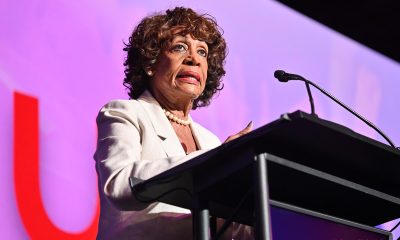
 AIDS and HIV2 days ago
AIDS and HIV2 days agoCongresswoman Maxine Waters introduces new resolution for National Black HIV/AIDS Awareness Day
-

 Books22 hours ago
Books22 hours agoNew book explores homosexuality in ancient cultures

